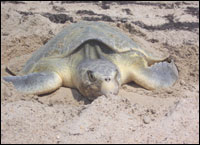Texas
-
The last to react
We all know and love the "canary in a coal mine" analogy, where the canary is a first warning sign of some potential catastrophe. The Arctic is a good example of a canary for climate change, since we expect (and indeed see) the effects of climate change there first.
Then there's the anti-canary. Rather than being the first to react, the anti-canary is the last. When the anti-canary moves on an issue, you know that everyone else has already moved.
In the climate change debate, Texas is the anti-canary. With the Governor, Lt. Governor, and other senior legislators arguing that the science is not proven, Texas has been stuck in neutral on this issue while other states have taken the lead. But there are indications that the anti-canary is beginning to take climate change seriously.
-
New coal plants like accelerating toward a wall
My colleague Jerry North and I wrote an op-ed about plans to build a slew of new coal plants in Texas. It was not published, but I think it makes some good points. Interestingly, many of these same points are made in a recently published op-ed reported on here.
-
National efforts to cut GHG emissions will suffer
Everyone is justifiably excited about the good news out of California, but a much more representative microcosm of the climate debate can be found in the
greatstate of Texas.Texas leads the nation in GHG emissions -- it spews more than Canada or the U.K. It has no plan for reducing those emissions. It has rejected legislative efforts to reduce them for years. In essence, Governor Rick Perry has said that he won't do anything until the feds do, which we all know is never.
Now it seems Texas is set to dramatically increase its emissions.
The state may soon approve the construction of 16 old-school coal-fired power plants:
The approval of 16 new power plants that burn coal, by far the most carbon-intensive fuel for making electricity, would add an estimated 117 million tons of carbon dioxide a year, more than the individual emissions from 33 other states and 177 countries.
The power companies say cleaner-burning coal technologies aren't "proven." The business lobby and the governor's office say curbs on GHG gases would hurt the economy.
-
How “merchant coal” is changing the face of America
From his rolling green soybean fields above a slow river in eastern Iowa, Don Shatzer looks out over the farm where he was raised, across land he and his neighbors have farmed all their lives. Below him are the garden beds where his wife Linda grows organic vegetables to safeguard the family’s health, and the […]
-
Wind farm follies

So, it seems they're going to build the nation's largest wind farm off the coast of Padre Island in Texas. Environmentalists are up in arms about ... wait for it ... the birds. Oy.
This bit from Texas Land Commissioner Jerry Patterson is amusing:
"Those who are concerned about view sheds shouldn't have a problem," he said. "There's nobody there to look at it."
Nice bank shot!
Speaking of view sheds and wind farms, I confess I haven't been following the latest drama over the much-discussed Cape Wind project all that closely, cause it makes me want to pull my hair out.
First Sen. Don Young (R-Alaska) offered an amendment to kill it. I think that one died. Then Young offered another amendment giving Mass. Gov. Mitt Romney, a longtime project opponent, the power to kill it. In conference committee, Sen. Ted Stevens (R-Alaska) whittled the amendment down so it only applied to wind projects in Nantucket Sound and then attached it to a Coast Guard funding bill.
-
Houston kids living near a Superfund site tell their stories in pictures
Collage: Wassim Elmetni (age 11). “Many Diversified Interests” sounds like a line from a college application, or advice from a responsible money manager. In fact, though, it’s the name of a Superfund site in the Fifth Ward, one of the oldest and most disenfranchised neighborhoods of Houston, Texas. For the most part, children growing up […]
-
Meet Robert Bullard, the father of environmental justice
Robert Bullard says he was “drafted” into environmental justice while working as an environmental sociologist in Houston in the late 1970s. His work there on the siting of garbage dumps in black neighborhoods identified systematic patterns of injustice. The book that Bullard eventually wrote about that work, 1990’s Dumping in Dixie, is widely regarded as […]
-
How do you define “environmentalism”?
Dave's environmental ethics post addressed an issue that has become more and more apparent here in Gristmill: the term "environmentalism" means something different to each one of us.
This is exemplified in today's Soapbox by Oliver Bernstein on environmental issues along the U.S.-Mexico border:
-
Drilling on a Texas barrier island could mess with sea turtles and other critters
Life’s a beach — and then you die. Photo: NPS. This time of year, a slim strip of Texas beach known as South Padre Island is hopping with bikini-wearing, hard-drinking college students on spring break. On neighboring North Padre Island, however, the scene tends to be quite a bit calmer. Nearly 70 miles of this […]
